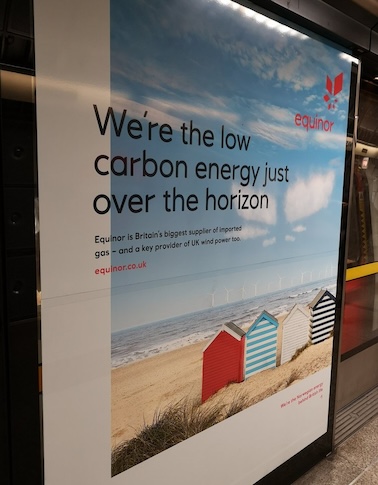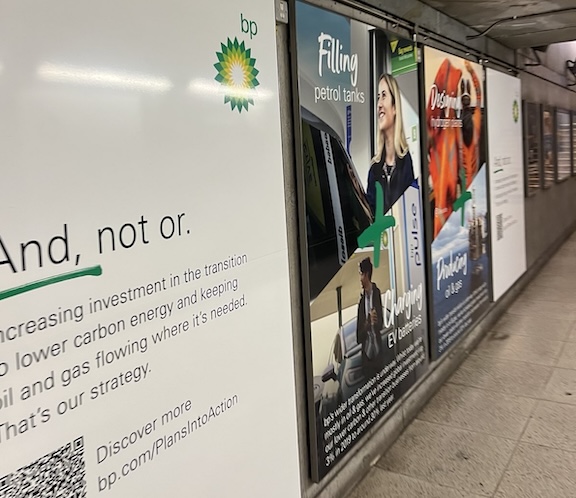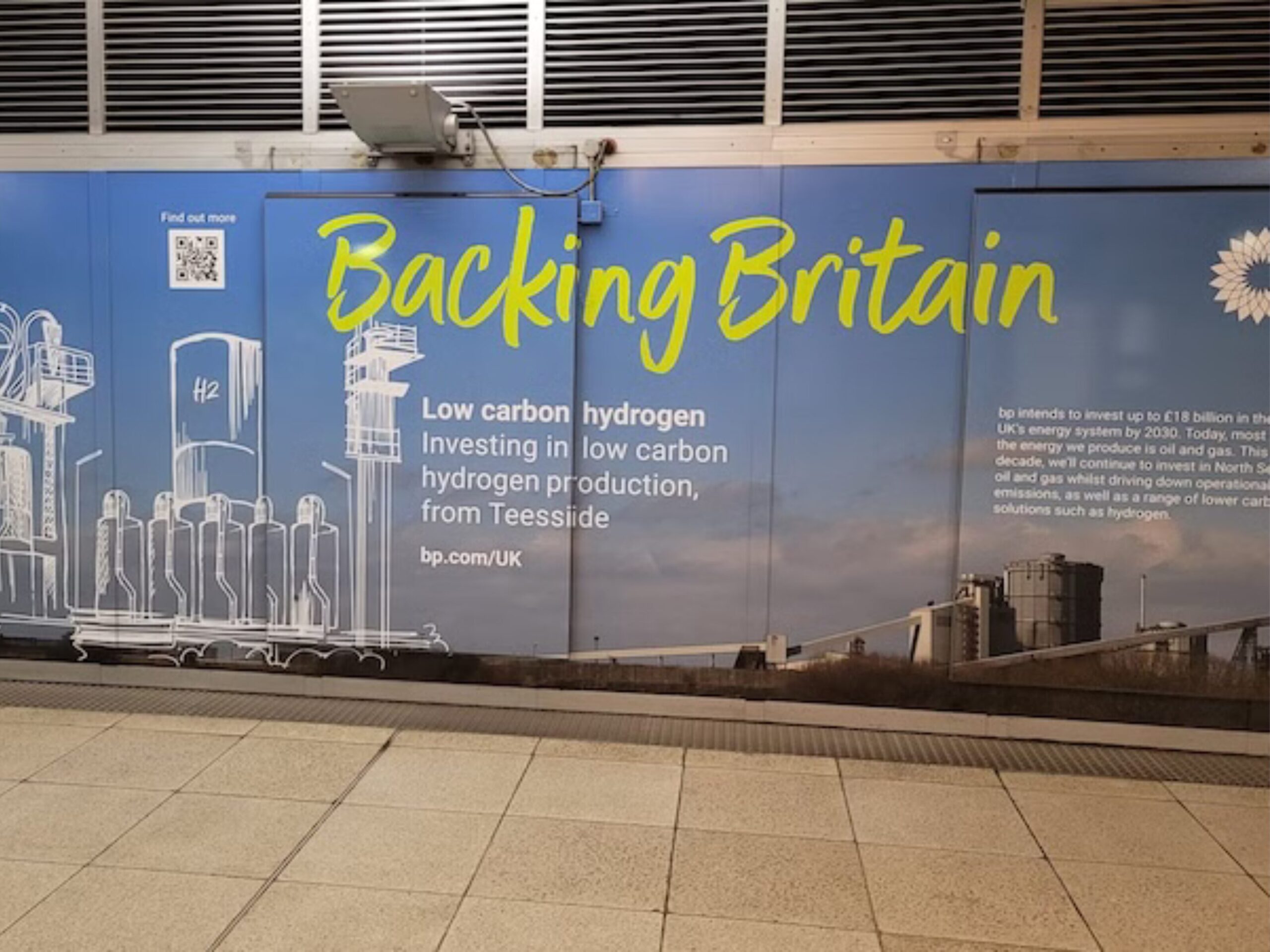Gassing Up the Lizzy Line: Transport for London Has Displayed 200+ Fossil Fuel Ads Since Zero-Carbon Pledge
8 Mins Read
Sadiq Khan faces calls to ban fossil fuel industry messaging from tube stations and buses.
By TJ Jordan
London’s public transport network has hosted more than 240 advertising campaigns by oil and gas companies including Shell, BP, and ExxonMobil since Mayor Sadiq Khan set his “zero carbon city” goal in 2018, DeSmog can reveal.
The findings come after United Nations Secretary-General Antonio Guterres called for a worldwide fossil fuel advertising ban, arguing that advertising companies were serving as “enablers to planetary destruction” by greenwashing polluting clients.
Using freedom of information (FOI) requests, DeSmog found that oil major BP was the most prolific fossil fuel advertiser on the Transport for London (TfL) network since the mayor pledged to zero out London’s carbon emissions by 2050 (later updated to 2030), placing 168 campaigns during the 2019-2020 fiscal year.
Fossil fuel advertisers including BP, Shell, and lobby group Offshore Energies UK (formerly Oil & Gas UK) specifically requested to place some ads containing political messaging at Westminster and St. James’s Park tube stations near Parliament, the requests showed.
“There’s no doubt that advertising has an impact on people’s behaviour, on the image of companies, and has the ability to directly affect decision makers like me,” said Sian Berry, who stepped down as London Assembly member in May, and is running for parliament for the Green party in the UK’s general election on July 4. “All of these things are harmful and will undermine TfL’s climate goals.”
Norwegian oil giant Equinor booked 14 campaigns, including three that appeared in 2022-2023 while the government was considering whether to approve its North Sea oilfield Rosebank. The project has since been approved and described by environmental law firm ClientEarth as a “carbon bomb”.

Since April 2022, TfL has also hosted two campaigns by the fossil fuel lobby group Canadian Energy Centre. The group’s CEO, Tom Olsen, has warned against “domestic and foreign-funded campaigns against Canada’s oil and gas industry”.
The number of campaigns rises to 1,275 when including energy suppliers that continue to use fossil fuels to provide a portion of their gas or electricity to households, such as E.ON, British Gas, and Scottish and Southern Energy.
Each campaign can contain multiple posters across different stations, but TfL’s media partners do not record those exact numbers.
TfL fossil fuel ads undermine mayor’s climate goals
Khan vowed to “double down” on climate and air pollution issues after winning May’s mayoral election.
Khan’s expansion of ULEZ (the Ultra Low Emissions Zone) in London, which levies a charge on cars that don’t meet certain environmental standards, has been the target of misleading ads by the Conservative Party, which criticised the move as a “driving charge”, DeSmog reported last week. Harmful pollution levels in central London are down 46 percent compared to a scenario without ULEZ, according to a City Hall report published in February last year.
But the promotion of fossil fuel interests on the TfL network — which sees nearly 10 million journeys a day — undercuts the mayor’s climate targets as well as TfL’s green image, said campaigners.
“TfL risks its climate commitments being completely derailed by the fossil fuel promo soaking its network,” said Veronica Wignall, co-director of the anti-advertising campaign Adfree Cities.
“Continuing to allow the fossil fuel industry to broadcast across London’s tubes, buses, and billboards undermines the Mayor’s climate goals by allowing some of the world’s top polluters to garner public and political support. This support then translates into delayed action, diluted regulation, and more emissions.”
Expanding ULEZ was a difficult decision – but it's the right one to save lives.
— Sadiq Khan (@SadiqKhan) August 24, 2023
I’ve continued to listen to Londoners' concerns – and every single Londoner with a non ULEZ compliant vehicle is now eligible for financial support.
pic.twitter.com/UJDxfSteY7
TfL is governed by the mayor’s office and the Greater London Authority, giving Khan the ultimate say over which ads can run on trains and buses, and in tube stations. The mayor did not respond to a request for comment.
TfL reported advertising revenue of £144 million in the last fiscal year, representing around 10 percent of its non-fare revenue, and hosted 13,920 advertising campaigns in 2023. TfL declined to break that figure down by individual advertisers, because it considers this commercially sensitive information that could prevent it from maximising advertising revenue.
TfL has stated that it is working towards a zero emissions bus fleet as well as powering the rail network entirely with renewable energy by 2030. A TfL spokesperson said that all advertising copy was reviewed on a case-by-case basis against TfL’s published advertising policy, which also requires advertisers to comply with guidance from the UK regulator, the Advertising Standards Authority, and the Committees of Advertising Practice — the organisation responsible for the UK’s advertising codes.
“Advertising copy pertaining to fossil fuel extraction, or copy submitted for brands affiliated with fossil fuel extraction, must meet the environmental guidance of the advertising industry regulators,” the spokesperson said.
Berry called this a “fudge” on TfL’s part, because the Advertising Standards Authority cannot rule on whether an ad is having a detrimental effect on society, only on whether it’s truthful.
TfL also stated in its response to DeSmog’s freedom of information requests that many of the ads promoted the companies’ investments in developing clean energy technologies. Previous DeSmog investigations have found that these types of campaigns often obscure how little these companies are really spending on fossil fuel alternatives.
The Advertising Standards Authority has banned a number of adverts run by oil and gas companies in the past 12 months for making misleading claims about green credentials. These included ads for Shell — created by VML (formerly Wunderman Thompson), which is owned by major holding company WPP — and Equinor.
In 2019, the regulator issued a warning to Equinor after an advert for the Norwegian oil giant at Westminster Station implied gas was a “low carbon” fuel.
The oil industry continues to make the vast majority of its investments in oil and gas, with just 2.5 percent of capital expenditure going to clean energy in 2022, according to the International Energy Agency. A peer-reviewed study published in the journal Plos One that year found that companies were talking more than ever about the energy transition and decarbonisation, while failing to invest in either.
‘Station domination’
DeSmog found that in 2022 and 2023, BP, Shell, SSE, British Gas, EDF, and Offshore Energies UK targeted their campaigns at Westminster or St. James’s Park tube stations. These stations have a high footfall of politicians, political advisors, and civil servants.
BP and Shell booked what TfL terms “station domination” campaigns, which typically include at least 28 posters and a branded takeover of all ticket barriers.
Of nine campaigns that Shell placed on the TfL network between April 2021 and April 2023, four targeted Westminster with station domination campaigns. Since 2022, Shell’s advertising agencies have included WPP’s VML and EssenceMediacom, which is owned by major holding group Omnicom.
BP’s adverts promoted the company’s role in supporting UK government clean energy targets and reflected language used by the Conservative Party for its social and economic programme for government. “Levelling-up. Working to produce 15% of the UK’s 2030 hydrogen target, from Teesside,” read a poster in one 2022 campaign.
BP ran six campaigns at Westminster in 2022 and four in 2023. During that period, agencies owned by WPP including VML, Grey, Landor, and Mindshare worked for BP.
In September 2023, BP targeted Westminster station with its “And, not or.” campaign. This reflected a trend amongst oil and gas companies to move away from the focus on promoting their green credentials, and towards painting the continued use of fossil fuels as necessary for energy security in the wake of Russia’s invasion of Ukraine.

One poster at the station read: “Increasing investment in the transition to lower carbon energy and keeping oil and gas flowing where it’s needed. That’s our strategy.”
Two months previously, OEUK had targeted Westminster with a campaign promoting the production of both fossil fuel and renewable energy in UK waters. “From the gale force winds of the English Channel, to the oil and gas fields of the North Sea”, read the ad.
“These campaigns definitely have an effect on politicians,” said Nicholas Cosburn, a former parliamentary assistant for a senior MP. “I think being able to advertise in Westminster station is as close as you can get to being able to advertise in Parliament itself.”
Berry, who described the targeted campaigns as “insidious”, believes that “the only reason you pay for advertising in Westminster is to get special access to the decision-makers.”
While much of BP, Shell, and OEUK’s advertising presents them as part of the government’s clean energy plans, they have also been lobbying the government for further investment in oil and gas in recent years, according to InfluenceMap.
UN chief: ban fossil fuel advertising
The call by Guterres, the UN chief, for a worldwide fossil fuel advertising ban underscores concerns over the influence that these ad campaigns may have had on UK energy policy, as well as public opinion.
“Many in the fossil fuel industry have shamelessly greenwashed, even as they have sought to delay climate action — with lobbying, legal threats, and massive ad campaigns,” Guterres said on June 5, “aided and abetted by advertising and PR companies”.
Guterres termed agency executives “Mad Men fuelling the madness” for creating these campaigns.
“Your sector is full of creative minds who are already mobilising around this cause,” he said. “They are gravitating towards companies that are fighting for our planet — not trashing it”.
Omnicom Group, WPP, Interpublic Group (IPG), Publicis Groupe, Dentsu, and Havas — the six holding companies that dominate the advertising industry — have joined Ad Net Zero, a voluntary industry initiative whose members pledge to reduce in-house carbon emissions generated by their own business operations.
None of these six companies’ net zero goals, however, consider the climate damages that may result from producing image-enhancing campaigns for heavily-polluting clients.

Junk food ad ban
Campaigners believe that there is a precedent for placing restrictions on high carbon ads in the transport system.
In 2019, Khan used his authority over advertising on TfL to restrict advertising for products high in sugar, salt, or fat (a ban that industry tried to avert with a coordinated lobbying effort, according to University of Bath researchers). A subsequent study, commissioned by the mayor’s office, found that calorie intake among London households from high fat, salt, and sugar foods dropped significantly in the following year.
Still, Khan has appeared reluctant to consider restrictions on fossil fuel advertising. At a Mayor’s Question Time in late 2022, Caroline Pidgeon, the Leader of the Liberal Democrats in the London assembly, asked whether TfL would consider a “low carbon advertising and sponsorship policy”. Khan responded that TfL policy requires all adverts on its estate to comply with Advertising Standards Authority regulations, and that the regulators were reviewing their environmental guidance at the time.
TfL’s 2023 climate adaptation report noted that transport makes up a quarter of London’s annual carbon emissions of 28.7 million tonnes, mostly due to private car usage. To tackle carbon emissions from petrol and diesel cars, TfL has positioned itself as a more sustainable way to travel, setting a target for 80 percent of travel in London to be made by walking, cycling, or public transport by 2041.
This article by TJ Jordan was originally published on DeSmog. It is republished here as part of the global journalism collaboration Covering Climate Now.



